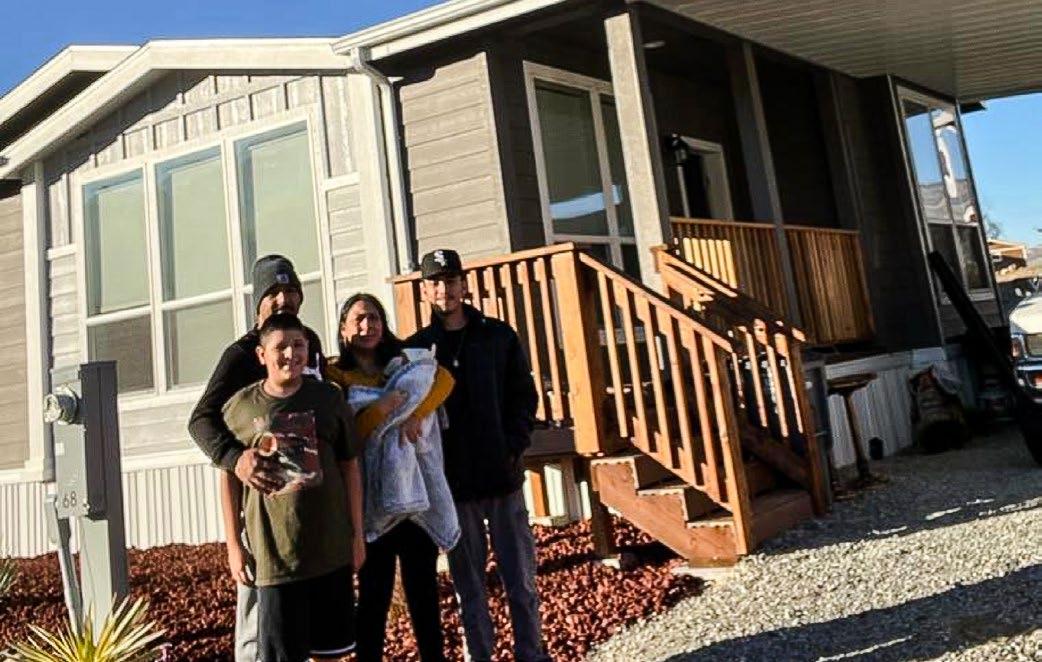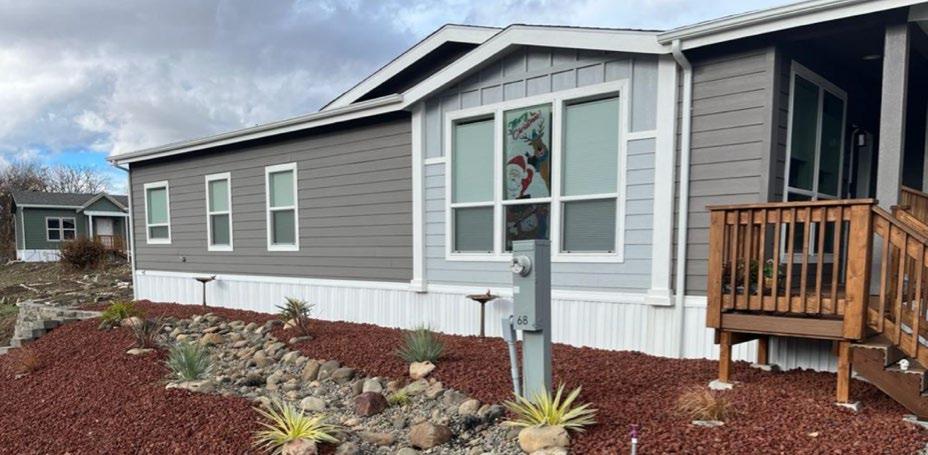
4 minute read
Community Voice: The Chavez Family
When the Almeda Fire struck in September 2020, Yakson Chavez and his family didn’t even have time to grab their belongings before barely making it out alive.
“We completely lost our home and that is what devastated my wife the most,” Yakson said. “She was one the one most affected by this disaster.”
Thankfully, the Chavez’s were able to find shelter at a friend’s house in Central Point, but they had to evacuate again after the fires spread there as well. Yakson and his family then went to stay with his daughter in Eugene.
It was while living in Eugene that they heard about help for fire survivors through ACCESS, a community action agency, in Jackson County. By December 2021, ACCESS was able to get them into the Gateway Transitional to Permanent Housing Project, an innovative, locally driven, and state-supported effort that provides temporary housing for fire survivors who may not be eligible to receive federal support. OHCS contributed $1.7 million to install infrastructure on a site where an additional $1.7 million from OHCS was used to buy 53 travel trailers for families in the Phoenix-Talent School District.
“It was small trailer for my family size, but I was happy to temporarily have somewhere for my family to sleep,” Yakson said.
Since Gateway is transitional housing, the Chavez’s still needed a permanent place to call home. Continuing to work with ACCESS, they were able to move into a three-bedroom, two-bathroom apartment through the Jackson County Housing Authority in June 2022 before obtaining an ACCESS loan to purchase a home in the Bear Creek manufactured home park in Ashland. In October, they moved into their new home.
“Thanks to the support of ACCESS case managers, my family and I were able to welcome our new addition to our family into our new home,” Yakson said.

Providing keys to homeownership
Down payment assistance
Down Payment Assistance (DPA) Program funds are awarded to organizations throughout the state to create, continue and expand their existing down payment assistance programs. Eligible homebuyers who have completed homebuyer education and the recommended counseling from a qualified organization may qualify for down payment and/or closing costs assistance. In 2022, in collaboration with partners, OHCS created a new DPA framework that increased the amount of DPA that homebuyers can qualify for and added a new eligibility category for first-generation homebuyers.
Additionally, by providing funding to developers, the Homeownership Programs Section fosters the creation of new and diverse types of affordable homes for purchase that are aligned with community needs through the following programs:

The Local Innovation and Fast Track Homeownership Program (LIFT)
LIFT is intended to create affordable homeownership opportunities for low- to moderate-income families. Using Article XI-Q bond funding as a source for housing development, LIFT requires the state to have an ownership or operational interest in any real property developed. Twelve projects were funded through the 2022 NOFA.
HOMEOWNERSHIP
$16.8M in LIFT funds that created 200 homes for those earning 80% area median income or less
Homeownership Development Incubator Program (HDIP)
This program developed a framework for the creation of a new homeownership development program that complements and expands the impact of LIFT and enables OHCS to incentivize the construction of all types of housing that meet the needs of local communities. In advance of our Homeownership Development NOFA, OHCS connected with the nine federally recognized Tribes in Oregon, individually and in a group setting, to solicit their input to shape a Tribal Set-Aside Grant opportunity. OHCS sees this as a start to partnering with Tribes to address their members’ homeownership needs.
Land Acquisition Revolving Loan Program (LAP)
LAP assists eligible organizations in Oregon to purchase land suited for affordable housing development. Typically, 40% of the LAP fund is designated for land that will be used for affordable homeownership projects.
PREDEVELOPMENT
$10.3M allocated from Land Acquisition Program
Homeownership centers
The Homeownership Programs Section provides funding through the Homeownership Assistance Program (HOAP) to support partners, including a network of homeownership centers across Oregon, to offer financial counseling, first-time homebuyer education, down payment assistance, and foreclosure counseling for families with low to moderate incomes. In 2022, 16 homeownership centers provided counseling and education to 2,440 new clients. In addition, 3,725 homeownership counseling sessions were attended. Of the 3,725 sessions, 2,400 were focused on financial literacy and 1,240 were focused on homebuyer education. For new clients, 682 attended prepurchase counseling and education, and 712 attended foreclosure prevention closure. 132 of the clients assisted through HOAP purchased homes.
2,440 clients who were assisted at a homeownership center
First-time homebuyer loans
The Homeownership Lending Section facilitates financing through the development and oversight of mortgage lending programs and products to assist low- to moderate-income Oregon homebuyers. Programs offered through this section include the Oregon Bond Residential Loan Program and the new Flex Lending Program debuting in March 2023, which are provided through approved mortgage lenders. Leveraging both mortgage revenue bonds and mortgage-backed security markets allows OHCS to assist more Oregonians to achieve the goal of homeownership than ever before.
HOMEOWNERSHIP
504 first-time homebuyers who received Oregon Residential Bond Loan
Manufactured housing leader
The Manufactured Housing Section expands housing options by preserving and improving manufactured dwelling parks, providing affordable gap financing to replace aging and energy-inefficient manufactured homes, and collaborating with stakeholders to develop policies and resources that support manufactured housing residents. The Manufactured Home Replacement Program launched subsequent to the 2020 Labor Day wildfires and played a key role in helping 35 wildfire survivor households replace their homes. To further support manufactured and marina communities, the Manufactured and Marinas Communities Resource Center (MMCRC) monitors manufactured park and marina state registry compliance, manages state Community Resource Dispute and Resolution grants, and provides mediation services to resolve disputes between park owners and tenants outside of court.
Housing Replacement
$3.8M
in loans committed for
52 Manufactured Home Replacements
MEDIATION
150 clients served through MMCRC mediation services
Foreclosure prevention
As the Homeownership Assistance Fund (HAF) was accepting applications, a separate effort by OHCS, the Division of Financial Regulation, the Oregon Department of Justice, and nonprofit Oregon Consumer Justice (OCJ) began in July to plan and implement a campaign aimed at preventing the thousands of 90-day delinquencies in Oregon from entering into foreclosure. A workgroup of these organizations developed a statewide paid media campaign, thanks to funding from OCJ. The team converted the Oregon Homeowner Support Initiative (OHSI) website, oregonhomeownerhelp.org, into a bilingual one that highlights foreclosure prevention resources, including a map of homeownership centers, FAQs, a foreclosure process timeline, and links to partner organizations like 211, which served as a call center. The paid media campaign that included social media, web, and radio ads focused on rural homeowners and other historically underserved populations and directed them to seek out housing counselors for more resources, including HAF. While the paid media campaign ended in October, the website and social media still promote foreclosure prevention services.
FORECLOSURE PREVENTION
472 individuals and households approved for Homeownership Assistance Fund







